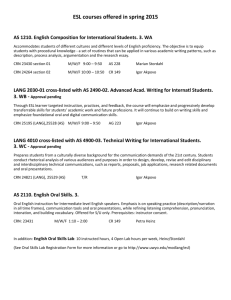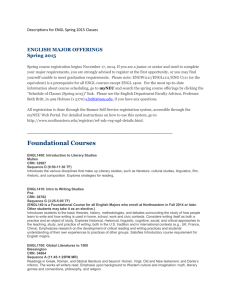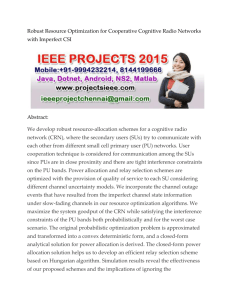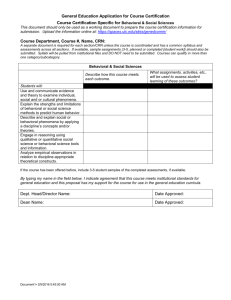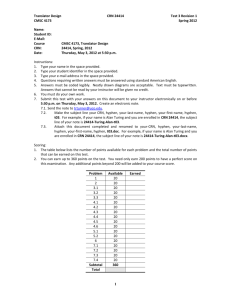Fall 2015 Courses
advertisement
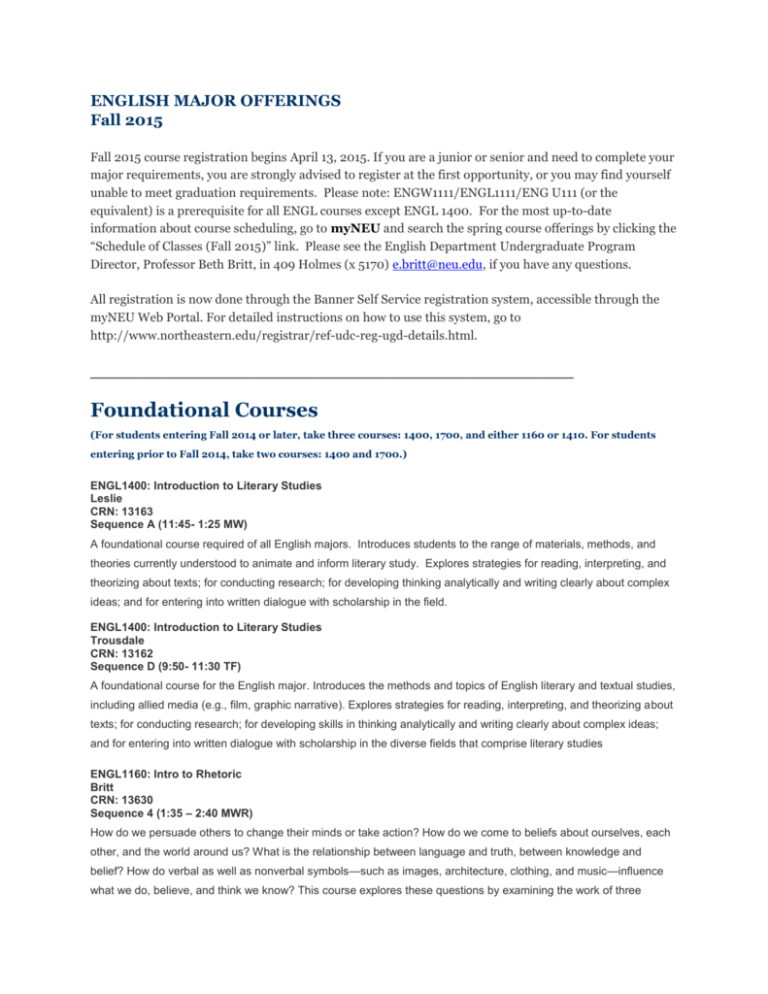
ENGLISH MAJOR OFFERINGS Fall 2015 Fall 2015 course registration begins April 13, 2015. If you are a junior or senior and need to complete your major requirements, you are strongly advised to register at the first opportunity, or you may find yourself unable to meet graduation requirements. Please note: ENGW1111/ENGL1111/ENG U111 (or the equivalent) is a prerequisite for all ENGL courses except ENGL 1400. For the most up-to-date information about course scheduling, go to myNEU and search the spring course offerings by clicking the “Schedule of Classes (Fall 2015)” link. Please see the English Department Undergraduate Program Director, Professor Beth Britt, in 409 Holmes (x 5170) e.britt@neu.edu, if you have any questions. All registration is now done through the Banner Self Service registration system, accessible through the myNEU Web Portal. For detailed instructions on how to use this system, go to http://www.northeastern.edu/registrar/ref-udc-reg-ugd-details.html. _____________________________________________________________________________ Foundational Courses (For students entering Fall 2014 or later, take three courses: 1400, 1700, and either 1160 or 1410. For students entering prior to Fall 2014, take two courses: 1400 and 1700.) ENGL1400: Introduction to Literary Studies Leslie CRN: 13163 Sequence A (11:45- 1:25 MW) A foundational course required of all English majors. Introduces students to the range of materials, methods, and theories currently understood to animate and inform literary study. Explores strategies for reading, interpreting, and theorizing about texts; for conducting research; for developing thinking analytically and writing clearly about complex ideas; and for entering into written dialogue with scholarship in the field. ENGL1400: Introduction to Literary Studies Trousdale CRN: 13162 Sequence D (9:50- 11:30 TF) A foundational course for the English major. Introduces the methods and topics of English literary and textual studies, including allied media (e.g., film, graphic narrative). Explores strategies for reading, interpreting, and theorizing about texts; for conducting research; for developing skills in thinking analytically and writing clearly about complex ideas; and for entering into written dialogue with scholarship in the diverse fields that comprise literary studies ENGL1160: Intro to Rhetoric Britt CRN: 13630 Sequence 4 (1:35 – 2:40 MWR) How do we persuade others to change their minds or take action? How do we come to beliefs about ourselves, each other, and the world around us? What is the relationship between language and truth, between knowledge and belief? How do verbal as well as nonverbal symbols—such as images, architecture, clothing, and music—influence what we do, believe, and think we know? This course explores these questions by examining the work of three important thinkers—Aristotle (fourth century B.C.E.), Kenneth Burke (20th century), and Judith Butler (20th-21st century)—who articulate the range and diversity of rhetorical theory. We will read theoretical texts by each of these authors with an eye toward applying them to examples of rhetoric drawn from modern-day culture. Assignments include reading quizzes, a mid-term exam, two short papers, and a take-home final. ENGL1700: Global Literatures to 1500 Blessington CRN: 15643 Sequence 3 (10:30 – 11:35 MWR) Readings in Greek, Roman, and biblical literature and beyond: Homer, Virgil, Old and New Testament, and Dante’s Inferno. The works all writers read. Emphasis upon background to Western culture and imagination: myth, literary genres and conventions, philosophy, and religion. Literary Periods (Students entering Fall 2014 or later take four period course: one in Early Literatures, one in 17th-18th C. Literatures, one in 19th C. Literatures, and one in 20th-21st C. Literatures. Students entering prior to Fall 2014 take five period courses: three pre-19th C., one 19th C., and one 20th/21st C.)) Early Literatures ENGL1600: Introduction to Shakespeare Leslie CRN: 14668 Sequence B (2:50-4:30 MW) An introduction to the four principle genres of Shakespeare’s drama: comedy, tragedy, history, and romance. We will consider the enduring power of Shakespeare’s work and legacy through close reading of the plays and an investigation of Shakespeare’s cultural, historical, generic and performance contexts. Short papers and a final exam, with creative and/or performance options for interested students. ENGL3605: Medieval Romance and Modern Readers Kelly CRN: 17052 Sequence 2:50 -4:30 MW We will read a variety of medieval romances (all in translation) and survey the development of the medieval vernacular romance—and the development of “romance”—in its historical and cultural context, and consider audience, theme, function, and influence. Likely texts: Chaucer’s Knight’s Tale and/or Troilus and Criseyde; selections from Sir Thomas Malory’s Morte D’Arthur; a few French romances, including excerpts from the legend of Tristan and Iseult and from the works of Marie de France and Chrétien de Troyes; and short treatises on love, lovesickness, adultery, marriage customs and laws. We will also examine some of these medieval romances in their modern versions or retellings as they appear in mainstream literary texts, fantasy, fairy tales (Snow White, for example), film, and art. In essence, we will study what Denis de Rougemont famously called Love in the Western World, and consider how the medieval concept of love, desire, and romance has certain continuities and discontinuities with our own. Requirements: a few very brief response papers and two essays, one due at midterm and one at the end of the course. 17th-18th Centuries ENGL2240: 17th Century British Literature Blessington CRN: 17034 Sequence E (11:45-1:25 WF) The seventeenth century in England was a great age of lyric poetry and prose. The poets produced poems that are still standards and models for modern poets. We shall examine the context and the techniques of such poets as John Donne, George Herbert, Ben Jonson, Robert Herrick, Richard Crashaw, Henry Vaughan, John Dryden and others. The prose of the era represents a spectrum of experimental styles, Ciceronian, anti-Ciceronian, Baroque, scientific, personal—a handbook of various ways to write. We shall consider selections from Francis Bacon, Robert Burton, Thomas Browne, John Bunyon, Samuel Pepys, and others. ENGL3160: Topics in 17th/18th Century British Literature: Women and the Novel in 18th C Britain Aljoe CRN: 15651 Sequence 11:45-1:25 MR This course will examine novels produced in Britain during the “long eighteenth century” (1688-1832). Framed by Parliamentary assertions of individual rights--the creation of the constitutional monarchy in 1689 and the Reform Acts of 1832 (which further limited the power of the monarch), as well as the rise of capitalism and the expansion of slavery, increased class mobility and industrialization, and changing gender roles--this period is marked by significant alterations in notions of the self and subject. These changes are manifest in many novels of the period, which not only had women as primary protagonists, but were also written by women. In addition to considering the development of the novel as a literary form, we will focus our attention on the relationships between the new genre and 18th century notions of gender. Questions to consider will include: Why are there so many 18th century British novels about female behaviour? What might be the significance of this seemingly overwhelming concern with female virtue and proper education? What becomes apparent after considering the rising popularity of the novel form and the simultaneous codification of gender conventions? Texts may include: Love in Excess, Moll Flanders, Pamela, Secrecy, Sense & Sensibility, Belinda, The Woman of Colour, and Zofloya. Assignments will include: reading responses, a formal paper or digital/archival assignment, and a group presentation. 19th Century ENGL2260: Romantic Poetry Peterfreund CRN: 17572 Sequence 1:25 - 2:40PM This course surveys the six canonical male English Romantic poets: William Blake; William Wordsworth; Samuel Taylor Coleridge; George Gordon, Lord Byron; Percy Bysshe Shelley; and John Keats. The course also incorporates writing by prominent female poets of the period, such as Anna Laetitia Barbauld, Joanna Baillie, Felicia Hemans, and Elizabeth Laetitia Landon. All of these poets wrote during the English Romantic Period (17891832), an era of significant social and intellectual change, although this change was not without its turbulence, confusion and, on too many occasions, its violence. The period was one in which English culture moved beyond traditional modes of knowledge, social organization, and belief, and into an intellectual, sociopolitical, and religious milieu in which the only certainty was uncertainty and the only constant was change. We will study the impact of the era on the individual, and the artistic response of that individual to the era. Students functioning in small work groups will take responsibility for framing some of the questions we should address in response to our reading. Grades in this course will be determined on the basis of three five-to-seven-page papers, written on topics chosen from a list of options. 20th/21st Centuries ENGL2440: Modern Bestseller Goshgarian CRN: 15647 Sequence 1:35-3:15PM TF "Bestseller" is an artificial category determined solely by numbers of books sold. However, we will explore some reasons behind the success of recent quality fictional best-selling--i.e., what special fantasies, obsessions, themes, plot lines, characters, action etc. appeal to popular tastes. The selections will represent a cross-section of mainstream and genres titles—e.g., thriller, mystery, "literary," etc.--by men and women, some of whom who have become brand names. Guest bestselling author(s) will visit class. We will also watch and discuss movies made from the works studied in the course. Student writing: announced quizzes; midterm & final take-home essay exams (7-10 pages each). Optional critical paper (7-10) pages analyzing a bestselling novel not read in the course. ENGL3200: Topics in 20th/21st Century British Literature: James Joyce’s Ulysses and 20th C. Criticism Mullen CRN: 17053 Sequence 9:15 – 10:20 MWR James Joyce was the most influential English language novelist of the 20th century. This course will be organized around the close reading of his groundbreaking work Ulysses. We will focus our reading by following a cluster of three themes: how does Joyce think about and reshape language? How does Joyce understand and engage history? What role does the body for Joyce? While these will be our primary questions for the course, along the way we will examine the myriad concerns that appear in this challenging text and the varied critical discussions that have taken up his writing. Concept and form go hand in hand for Joyce and so the course will also pay careful attention to Joyce’s style, in particular his development of stream of consciousness and free indirect discourse. Finally, while Joyce is difficult, he is also one of the great comic writers—our reading of Ulysses will engage this comedy and we will laugh a lot. Take this course in the fall as a steppingstone to reading Finnegans Wake in the spring capstone! ENGL3685: From Kafka to Kushner Lefkovitz CRN: 17041 Sequence 2:50 – 4:30 MW Note: This course also satisfies the Diversity requirement for students entering Fall 2014 or later. Through close reading of selected poems and stories, we will survey Jewish literature from the late Modern (18801948) and contemporary (1948-present) periods. We will consider themes of immigration and cross-cultural influences and issues of religious, ethnic, and gender identity. With an emphasis on American and European literatures, the course will begin to define an international Jewish literary canon, considering the work of Yiddish poets and playwrights, Russian Jewish writers, and such classic modern writers as Kafka, Roth, Malamud, Olsen, and Paley. Concluding with Wiesel’s literary reflections on the Holocaust, Ginsberg’s poetry of the 60s, and emerging American novelists, such as Dara Horn and Nicole Krauss, we will look at the intersection of Jewish and host civilizations and identify themes, concerns, anxieties, aspirations, technical strategies, and stylistic features of a distinctively Jewish—though multilingual and multicultural—literary tradition. Comparative (Take Two Courses. For students entering prior to Fall 2014, this category is called “Transnational/Transhistorical” on your audit.) ENGL1502: American Literature to 1865 Davis CRN: 15642 Sequence 3 (10:30 – 11:35 MWR) This survey course of American literature from the colonial period up to the Civil War will focus on poetry, autobiography, and fiction. In considering literary history through the lens of genre—focusing on each in turn—we’ll be able to weigh different ways of constructing what counts as literature, and how literature speaks in different contexts—colony, revolution, and nation on the brink of war. We will read: poetry by Anne Bradstreet, Edward Taylor, Phyllis Wheatley, Philip Freneau, Emily Dickinson and Walt Whitman: autobiographies by Mary Rowlandson, Benjamin Franklin, Henry David Thoreau, Harriet Jacobs, and Frederick Douglass; and fiction by Susannah Rowson, Nathaniel Hawthorne, Edgar Allan Poe, and Herman Melville. Assignments will include midterm, final exam. ENGL2370: The Modern Short Story TuSmith CRN: 17036 Sequence 2 (MWR 9:15-10:20) This course explores a range of American short stories by a diversity of prominent writers from 20th and 21st centuries. Short story cycles are examined for their artistic aspects (e.g., narrative structure, point of view, visual imagery, linguistic experimentation, thematic development) within their appropriate socio-historical context. Requirements include brief weekly responses to readings (posted on Blackboard), textual explications, annotations of scholarly articles, and a final analytical paper. ENGL2520: Science Fiction Goshgarian CRN: 17039 Sequence 9:50- 11:30 TF This course traces the development of various science fiction themes, conventions, and approaches from early human-versus-machine tales to alien encounters. We will examine how SF is a time capsule of ideas about the relationship between humans and technology, humans and nature, humans and the stars in all their promise and dangers. From Mary Shelley’s Frankenstein, through H.G. Wells, through short fiction of the "golden age" (1940s and 50s), to the visions of current authors. Short stories, novels, movies. Student writing: announced quizzes; midterm & final take-home essay exams (7-10 pages each); optional critical paper (7-10 page) analyzing some SF work not read in the course. ENGL2460: Multiethnic Literature of the US TuSmith CRN: 17037 Sequence 10:30 – 11:35 MWR NOTE: This course also satisfies the Diversity requirement for students entering Fall 2014 or later. This course explores contemporary issues through narrative prose (e.g., short story, novel) by American writers from distinct ethnic groups (e.g., Native, Asian, African, Latino/a, Jewish, Italian, Irish, Arab), focusing on family as common ground across cultures. Each work is examined within its socio-historical context as well as its artistic/formal aspects. Films and taped interviews, in conjunction with other interactive classroom activities, contribute to collaborative learning. Requirements include substantial reading, brief weekly responses to readings (posted on Blackboard), a midterm exam, and a final paper. Theories & Methods (Take One Course) ENGL3381: Processes of Writing and Tutoring Gonso CRN: 17594 Sequence 9:15-10:20 MWR Note: This course also fulfills the Experiential Education requirement for English majors. The purpose of this class is three-fold: It is designed to help students reflect on and improve their writing. It is also designed to help students explore and understand the complex processes involved in written composition. Finally, it is designed to prepare students to become writing consultants, whether at the Northeastern Writing Center or at various educational sites, including community literacy agencies and Boston-area public schools (As part of participating in an experiential-learning course, students will be required to spend approximately 3-4 hours per week “experiencing” the act of tutoring writing at partner sites.). As consultants, students will be able to apply the knowledge they are gaining in the course to help other students improve their writing. To accomplish these goals, we will (a) examine what researchers and theorists have said about writing, (b) examine what theorists and practitioners have said about teaching in a conference setting, and (c) observe, examine, and reflect upon our own experience as writers and tutors. Students will produce in a wide variety of genres, conduct primary research on their tutoring sessions, respond to readings and reflect on experiences, and present in-class activities on the teaching of writing. ENGL 3381 satisfies the experiential learning and writing-intensive requirement for English majors and is an elective option for Rhetoric minors. ENGL4130: Seminar in Writing Studies: What is Good Writing? Poe CRN: 17044 Sequence 10:30 – 11:35 MWR Do you know good writing when you see it? Who decides what good writing is? How do you teach students to produce good writing? Is the teaching of good writing an aesthetic ideal, a practical goal, or an imperial project? In this seminar, we will explore the various technical, aesthetic, and ethical dimensions of determining what makes for good writing. We will take up issues such as the history of writing assessment (where we get the epistemological and methodological frameworks we use today), standard setting (how criteria for “goodness” are established), and ideologies of writing assessment (why various means of evaluating writing have disparate consequences for different people). Along the way, we will examine specific tests of writing, try various approaches in responding to student writing, and work with new technologies for evaluation, including automated essay scoring and voice response technology. Readings for the course will include Assessing Writing: A Critical Sourcebook, Race and Writing Assessment, as well as selections from On a Scale: A Social History of Writing Assessment, Cultural Validity in Assessment: Assessing Linguistic and Cultural Difference, and Very Like a Whale: The Assessment of Writing Programs. Additional articles from authors such as Fanon and Bourdieu will be available online. Projects will include (1) a key work project in which you will trace the reception of a text, (2) a review of classroom grading practices or an analysis of the Northeastern Writing Program assessment data, and (3) a literature review on a topic of your interest. LING1150: Introduction to Language and Linguistics Section CRN Sequence Days & Time Instructor 1 15356 C 8:00 – 9:40 TF (Honors) Malhotra 2 10485 6 11:45 – 12:50 TRF Painter 3 16445 D 9:50 – 11:30 TF Malhotra 4 10337 F 1:35 – 3:15 TF Malhotra 5 11847 9:15 – 10:20 MWR Painter 7 12151 2:50 – 4:30 MW Cooper 8 12152 3:25 – 4:30 TWF Painter 9 12153 1:35 – 3:15 TF Malhotra Writing (Students entering Fall 2014 or later take two courses. Students entering prior to Fall 2014 can take these courses as electives.) ENGL2710: Style & Editing Britt CRN: 15901 Sequence 11:45 – 1:25 MWR Style is often thought of as the clothes with which we dress our thoughts. Such an understanding tends to separate what we say from how we say it. Since antiquity, philosophers and others have urged speakers and writers to speak as plainly as possible to allow the truth of their thoughts to emerge unadulterated by language. Others have argued that language and thought cannot be so neatly separated, that what we say cannot be disentangled from how we say it. Drawing on the rhetorical tradition, this course explores the relationship between style and substance through close attention to choices made at the level of the document, paragraph, sentence, and word. You will develop a vocabulary for describing the stylistic techniques of other authors, and then you’ll use the practices of imitation to make these techniques your own. The course will also cover copyediting and proofreading, giving you practice in achieving the clear style so highly valued today. By the end of the course, you will be able to assess the editing needs of documents and use copyediting marks, style sheets, and reference materials to edit documents accurately and consistently. Assignments may include a style blog, tests, short papers, and several editing projects. ENGL3376: Creative Non-Fiction Lerner CRN: 17040 Sequence 9:50 – 11:30 TF Creative non-fiction is a genre in which writers apply narrative strategies and techniques to factual material. This course will orient writers within the genre as we address the following questions: What is creative non-fiction? What makes it different than other approaches to writing about factual material? What does the best creative non-fiction require of its writers? Over the semester we’ll read and write our way to answers through a variety of non-fiction forms (for example, narrative essays and narrative journalism, travel and science writing, memoir, editorials). We'll also consider cross-genre and hybrid forms (for example, non-fiction prose mixed with poetry, audio and graphic nonfiction). Class time will include lectures, discussion of readings, writing exercises, and feedback for peers in a workshop format. The topics for creative non-fiction writing apply to a wide array of disciplines, including the humanities, the sciences, and journalism. ENGL2520: Science Fiction Goshgarian CRN: 17039 Sequence 9:50 – 11:30 TF This course traces the development of various science fiction themes, conventions, and approaches from early human-versus-machine tales to alien encounters. We will examine how SF is a time capsule of ideas about the relationship between humans and technology, humans and nature, humans and the stars in all their promise and dangers. From Mary Shelley’s Frankenstein, through H.G. Wells, through short fiction of the “golden age” (1940s and 50s), to the visions of current authors. Short stories, novels, movies. Student writing: announced quizzes; midterm & final take-home essay exams (7-10 pages each); optional original SF story or critical paper (7-10 page) analyzing some SF work not read in the course. Diversity (Students entering Fall 2014 or later take one course, which may double-count for another requirement. Students entering prior to Fall 2014 can take these courses as electives or to fulfill other requirements.) ENGL3685: From Kafka to Kushner Lefkovitz CRN: 17041 Sequence 2:50 – 4:30 MW See course description under 20th/21st C. Period courses, above. ENGL2460: Multiethnic Literature of the US TuSmith CRN: 17037 Sequence 10:30-11:35 MWR See course description under Comparative courses, above. Capstone Seminar (Take One Course) ENGL4710 Capstone Seminar: Muckraking Kaplan CRN: 10584 Sequence E 11:45 – 1:25 WF This course, on the “long Twentieth Century” of American realism, via muckraking, will consider the American muckraking tradition, as a literary tradition, with particular attention to the ways in which muckraking writers have employed rhetorical and realist techniques with an eye to persuasion and audience engagement. Analysis of the muckraking tradition will also engage methodological issues of rhetoric, close reading, historical context, literary horizons of expectation, reader response, and disciplinary boundaries and canons, as well as taste and value. We will attend to changing critical perceptions of muckraking from its early inclusion in influential anthologies to its near total disappearance from literary courses. Our course will begin with (selections from) the earliest works of American muckraking, such as Nellie Bly’s “madhouse” exposes (1887), Jacob Riis’s How the Other Half Lives (1890), and continue with the American muckrakers associated with McClure’s magazine: Upton Sinclair, Ray Stannard Baker, Lincoln Steffens, and Ida Tarbell. Attention to a second generation of mid-century muckrakers will include activists, such as Stetson Kennedy (whose undercover investigations of the Klan raised controversy about narrative ethics and authenticity), Jessica Mitford (who revitalized the tradition as advocacy of working and poor people in books such as the blockbuster American Way of Death, and Kind and Usual Punishment: The Prison Business) and Rachel Carson (whose Silent Spring (1962) is widely credited with inaugurating the modern environmental movement). Our reading will continue with recent works of popular muckraking, such as Barbara Ehrenreich’s Nickel and Dimed (2001), Naomi Klein’s No Logo: Taking Aim at the Brand Bullies (2000), Eric Schlosser’s Fast Food Nation (2001), and Sasha Abramsky’s, How the Other Half Still Lives, (2013). Muckraking works will be considered in the context of the realist works with which the muckrakers, as writers, were in conversation, including possible excerpts from Theodore Dreiser, Jack London, and others. Course requirements will include a short paper, which could be a muckraking work of creative narrative non-fiction, a critical paper, active participation, and discussion leading.
